Content writers are the wordsmiths behind your brand's voice, crafting compelling narratives that engage audiences and drive conversions. However, many companies struggle to find the right talent, often overlooking the nuanced skills that make a great content writer. It's not just about writing ability; it's about finding someone who can adapt to your brand's tone, understand your audience, and deliver content that achieves your business goals.
This comprehensive guide will walk you through the process of hiring a top-notch content writer, from defining the role to making the final selection. We'll cover key skills to look for, where to find talent, and how to effectively evaluate candidates. For a deeper dive into the specific skills required for content writers, check out our detailed skills analysis.
Table of contents
Key Skills and Qualifications for Hiring a Content Writer
Crafting the perfect candidate profile for a Content Writer can be tricky. What one organization considers non-negotiable might be just a nice-to-have for another. It’s essential to clearly delineate between the required and preferred skills to avoid mismatches during the hiring process.
Here are the key skills and qualifications to look for:
Required Skills:
- Bachelor's degree in English, Journalism, Communications, or a related field
- At least 2 years of professional content writing experience
- Excellent command of the English language and grammar
- Strong research and analytical skills
- Ability to meet deadlines and manage multiple projects
Preferred Skills:
- Experience with SEO best practices
- Familiarity with content management systems like WordPress
- Knowledge of social media platforms and digital marketing
- Proven experience in a specific industry or niche
- Strong interpersonal and communication skills
| Required skills and qualifications | Preferred skills and qualifications |
|---|---|
| Bachelor's degree in English, Journalism, Communications, or a related field | Experience with SEO best practices |
| At least 2 years of professional content writing experience | Familiarity with content management systems like WordPress |
| Excellent command of the English language and grammar | Knowledge of social media platforms and digital marketing |
| Strong research and analytical skills | Proven experience in a specific industry or niche |
| Ability to meet deadlines and manage multiple projects | Strong interpersonal and communication skills |
How to write a Content Writer job description
Crafting a compelling Content Writer job description is key to attracting the right candidates. After establishing your ideal candidate profile, encapsulate that information to make your job description stand out.
- Highlight responsibilities and impact: Clearly define what the Content Writer will do and how their work will contribute to your organization. This attracts candidates who seek meaningful roles and understand the value they will add.
- Balance technical skills with creativity: While it's important to mention necessary skills like SEO, editing, and content management systems, don't forget to emphasize creativity and storytelling. A mix of both ensures you draw in versatile candidates.
- Showcase unique selling points: Let potential candidates know what makes your company and the role special. Whether it's the chance to work on diverse projects or a great workplace culture, these elements make your listing attractive. For more details on responsibilities and skills, explore the content writer job description.
Where to Find Top Content Writers
Now that you have a solid job description, it's time to list your opening on job platforms to source candidates. The right platform can make a significant difference in attracting qualified content writers. Let's explore some top options for finding your next content creator.
LinkedIn Jobs
Ideal for finding full-time content writers. Offers a large pool of professional candidates and allows detailed job postings with company branding.

Indeed
Great for posting full-time content writing positions. Reaches a wide audience and offers resume search capabilities.

Upwork
Perfect for hiring freelance content writers. Offers a large pool of global talent with various skill levels and hourly rates.

Beyond these popular platforms, there are several niche sites catering to specific writing needs. From remote work specialists to media industry experts, these platforms offer diverse talent pools. Remember, the key to successful hiring is not just posting on multiple sites, but choosing the right assessment tools to evaluate candidates effectively.
How to Screen Content Writer Resumes?
When hiring a content writer, resume screening helps you quickly narrow down candidates who meet your requirements, saving time in the hiring process. With a sea of applicants, focusing on resumes that portray the right skills ensures you're considering the best potential fits for your role.
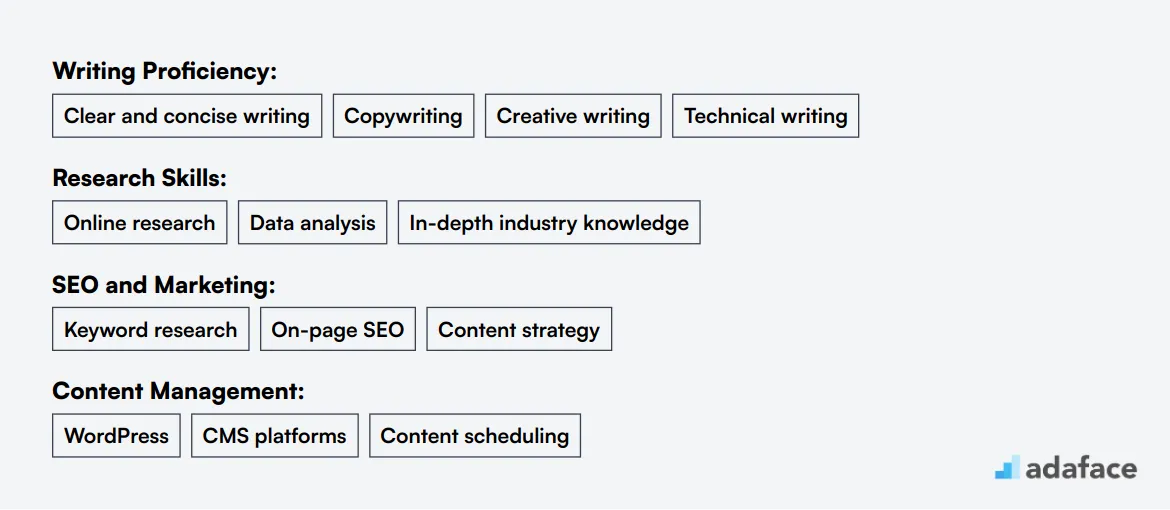
To manually screen resumes, look for important keywords related to content writing. These include a Bachelor's degree in a relevant field, at least 2 years of experience, excellent English language skills, strong research abilities, and deadline management. This manual method helps eliminate candidates who don't align with your core criteria, allowing you to focus on those that do.
Alternatively, AI tools can enhance your screening process by automating keyword matching. These tools help you efficiently identify resumes with the necessary skills by analyzing keywords and phrases. This method can be a game-changer for hiring managers, enabling them to process more applications quickly and accurately.
Here's a prompt you can use with AI tools to screen resumes for a content writer role:
TASK: Screen resumes to match job description for content writer role
INPUT: Resumes
OUTPUT: For each resume, provide following information:
- Email id
- Name
- Matching keywords
- Score (out of 10 based on keywords matched)
- Recommendation (detailed recommendation of whether to shortlist this candidate or not)
- Shortlist (Yes, No or Maybe)
RULES:
- If you are unsure about a candidate's fit, put the candidate as Maybe instead of No
- Keep recommendation crisp and to the point.
KEYWORDS DATA:
- Writing Proficiency (Clear and concise writing, Copywriting, Creative writing, Technical writing)
- Research Skills (Online research, Data analysis)
- SEO and Marketing (Keyword research, On-page SEO)
For more guidance on content writer roles, refer to the content writer interview questions and explore the skills required for content writer.
Recommended Skills Tests for Content Writers
Skills tests are a reliable way to evaluate content writers beyond their resumes. They help you assess specific abilities needed for the role. Here are five key tests we recommend for screening content writers:
Content Strategy Test: This test evaluates a candidate's ability to plan, create, and manage content across various platforms. It assesses skills in content planning, audience targeting, and measuring content performance.
Copywriting Test: Use this to gauge a writer's skill in crafting compelling copy. It checks their ability to write persuasive content for different formats like ads, emails, and landing pages.
SEO Assessment Test: This test measures a candidate's understanding of search engine optimization principles. It covers keyword research, on-page optimization, and link building strategies.
Communication Test: Effective communication is key for content writers. This test evaluates a candidate's ability to convey ideas clearly and adapt their writing style to different audiences and purposes.
English Comprehension Test: For content writers working in English, this test assesses their grasp of the language. It covers grammar, vocabulary, and reading comprehension skills essential for producing high-quality content.
Case Study Assignments to Evaluate Content Writers
Case study assignments can be effective for assessing content writers' skills, but they come with drawbacks. These assignments often have low completion rates due to their length and may deter good candidates. However, when used strategically, they can provide valuable insights into a writer's abilities.
Content Strategy Development: This assignment asks candidates to create a content strategy for a fictional company or product. It evaluates their ability to understand audience needs, set content goals, and plan content distribution. This task is particularly useful for assessing content strategist skills and big-picture thinking.
Blog Post Creation: Candidates are given a topic and asked to write a full blog post, including headline, subheadings, and body content. This assignment tests their writing skills, SEO knowledge, and ability to engage readers. It's an excellent way to evaluate a writer's style and voice.
Social Media Campaign: This task involves creating a series of social media posts for a specific product or event. It assesses the writer's ability to craft concise, engaging content for different platforms. This assignment is ideal for evaluating skills in social media writing and brand voice consistency.
Structuring the Interview Stage for Content Writers
After candidates pass the initial content writer skills tests, it's time for technical interviews. These interviews are crucial as they allow you to assess hard skills more deeply than screening tests. They help identify the best-suited candidates for your content writing role.
Here are some example interview questions to consider:
- Can you walk us through your content creation process?
- How do you research and verify information for your articles?
- How do you adapt your writing style for different audiences or platforms?
- Can you give an example of how you've optimized content for SEO?
- How do you handle feedback and revisions on your work?
- What tools do you use for content planning and organization?
What is the Cost of Hiring a Content Writer?
When considering the cost to hire a content writer, it's important to note that the average salary varies widely based on factors such as location and experience. In the United States, for example, salaries can range from $34,979 for entry-level positions to as high as $96,267 for seasoned writers.
Globally, salaries can shift drastically. For instance, content writers in Australia average around AUD 73,978, while those in Canada can expect to earn between CAD 39,275 and CAD 72,278 depending on their location and expertise.
Content Writer Salary in the United States
The average salary for a content writer in the United States is approximately $62,736. Salaries can vary significantly based on location, with entry-level positions starting around $34,979 and experienced writers earning up to $96,267. For instance, content writers in Washington, DC can command salaries as high as $234,363, while those in Miami, FL may earn closer to $62,344.
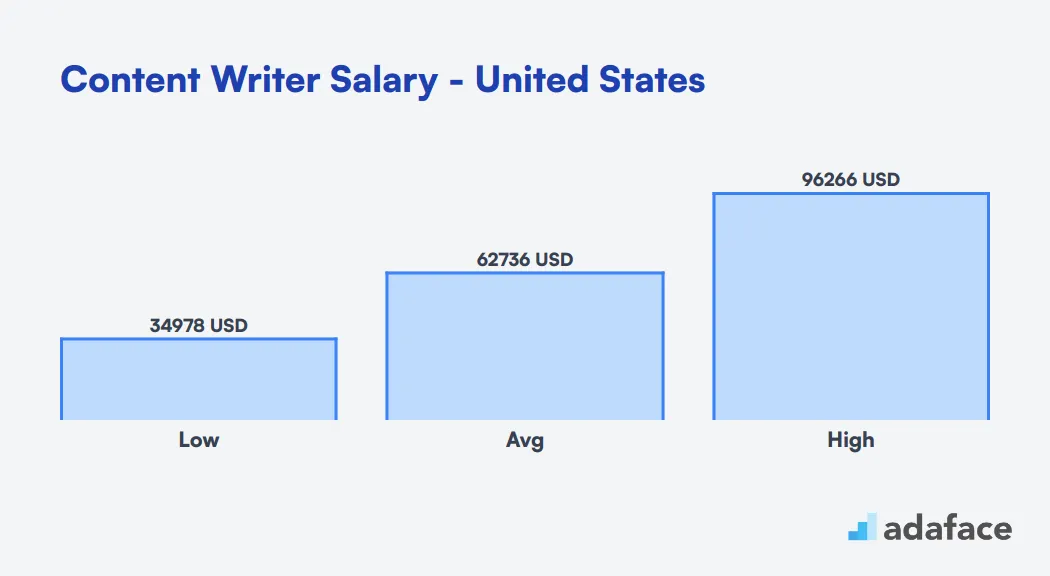
Content Writer Salary in the United Kingdom
The average salary for a content writer in the United Kingdom is approximately £28,000 per year. Entry-level positions can start around £22,000, while experienced writers can earn upwards of £40,000. Factors such as industry, location, and individual expertise can significantly influence these figures.
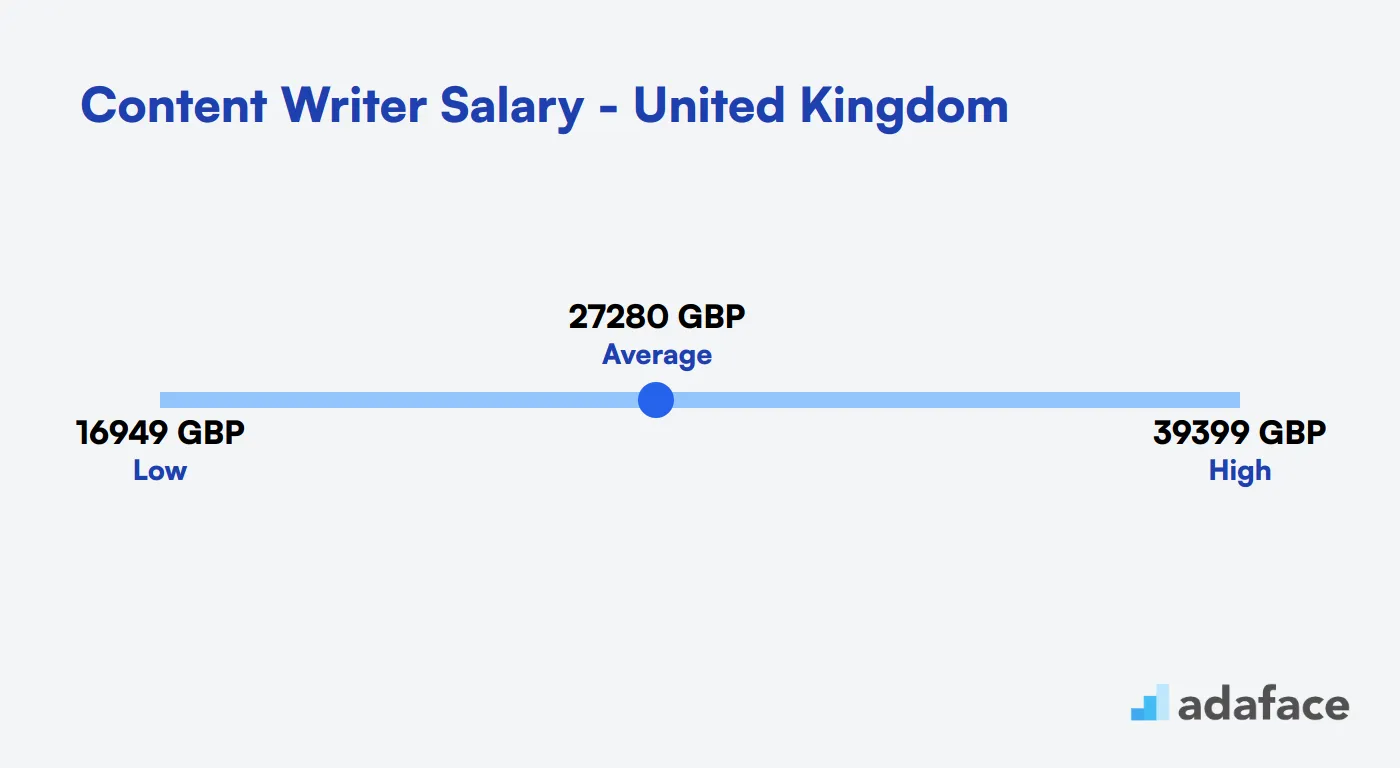
Content Writer Salary in Australia
In Australia, Content Writers earn an average salary of AUD 73,978 per year. The salary range typically falls between AUD 50,625 and AUD 100,613, with the median at AUD 71,369.
Location plays a significant role in determining Content Writer salaries. For instance, Canberra offers the highest average at AUD 217,736, while Perth sits at the lower end with an average of AUD 71,990.
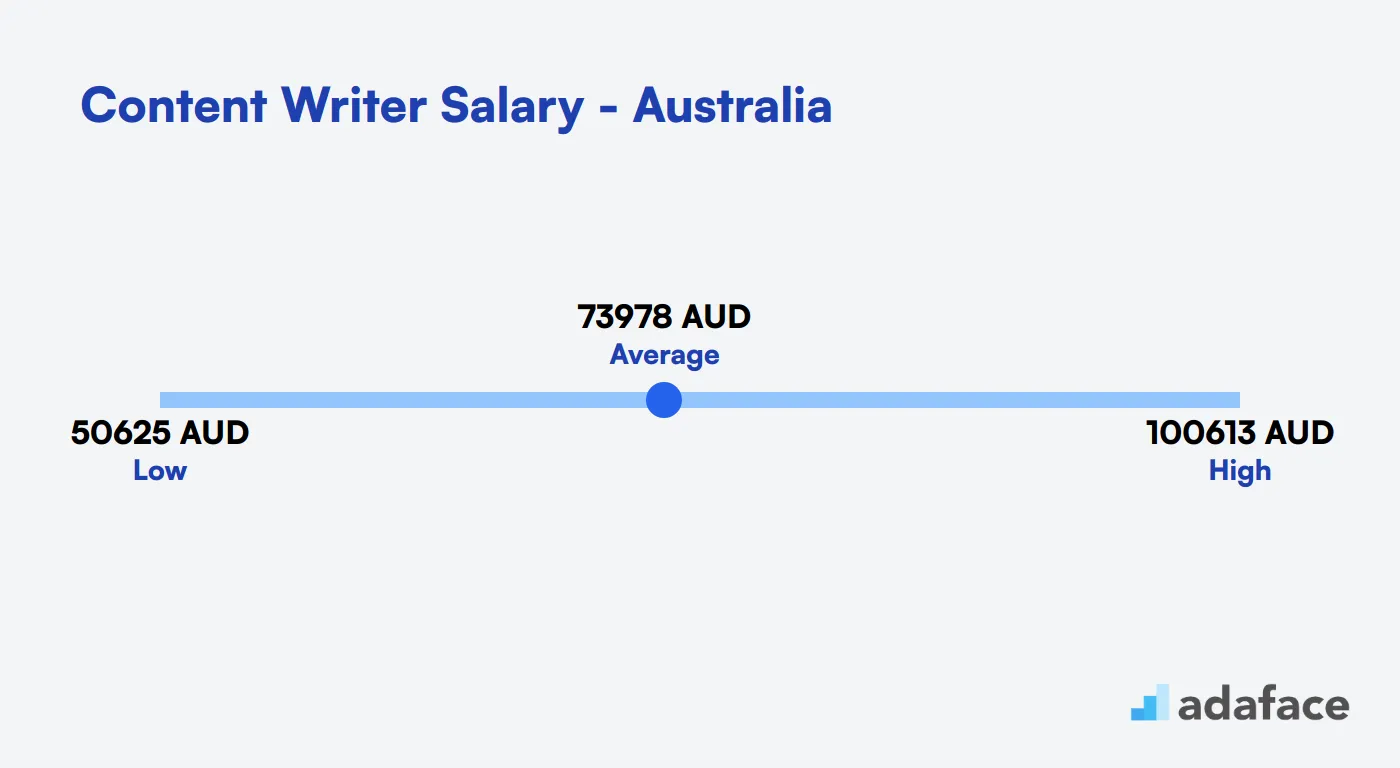
Content Writer Salary Canada
In Canada, the average content writer salary ranges from CAD 39,275 to CAD 72,278. The median salary sits at approximately CAD 53,280. Depending on the location, this can vary significantly; for instance, in Toronto, salaries can go up to CAD 137,892, while in cities like Bolton, the upper range is about CAD 58,785. This information can help you gauge competitive salary offerings when hiring content writers in different Canadian cities.
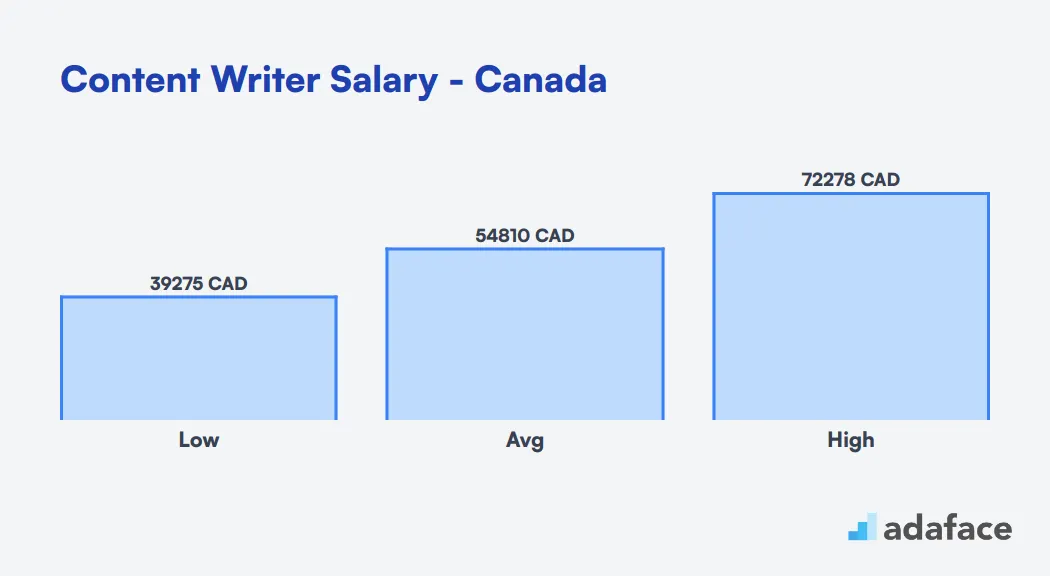
What's the difference between a Content Writer and a Content Strategist?
The roles of Content Writer and Content Strategist often get mixed up, but they're not quite the same. Both are integral to content creation, yet they focus on different aspects of it. Let's break it down.
A Content Writer is primarily focused on the creation of written content. This includes writing articles, blog posts, and product descriptions. Their typical education is in English or Journalism. Key skills for a content writer include writing, editing, and conducting research. They often use word processors and grammar checkers, and they usually collaborate with editors and subject matter experts.
On the other hand, a Content Strategist is more involved in planning and overseeing content initiatives. They tend to have a background in Marketing or Communications, often holding a Bachelor's or even a Master's degree. Their skills are more oriented towards strategy, analytics, and project management. Content strategists use tools like content management systems and analytics tools, creating deliverables such as content calendars and performance reports. They typically collaborate with marketing teams and executives.
For a deeper understanding of what skills are needed for these roles, you can explore our skills assessment tools.
| Content Writer | Content Strategist | |
|---|---|---|
| Primary Focus | Creating written content | Planning and overseeing content initiatives |
| Typical Education | Bachelor's in English/Journalism | Bachelor's or Master's in Marketing/Communications |
| Key Skills | Writing, editing, research | Strategy, analytics, project management |
| Tools Used | Word processors, grammar checkers | Content management systems, analytics tools |
| Typical Deliverables | Articles, blog posts, product descriptions | Content calendars, style guides, performance reports |
| Collaboration | Editors, subject matter experts | Marketing teams, executives, content creators |
| Career Progression | Senior writer, editor | Content director, marketing manager |
| Metrics Focus | Readability, engagement | ROI, conversion rates, overall content performance |
What are the ranks of Content Writers?
Many recruiters often confuse content writers with other roles in the content creation space, such as copywriters and content strategists. Understanding the different ranks of content writers can help in making better hiring decisions and defining job responsibilities.
• Junior Content Writer: This is an entry-level position where writers focus on creating basic content under supervision. They are typically tasked with writing blog posts, articles, and social media content while learning the ropes of the industry.
• Content Writer: At this level, writers are expected to produce more complex content and can work independently. They often specialize in certain niches and may also be involved in researching and optimizing their content for SEO.
• Senior Content Writer: Senior content writers have a wealth of experience and often take on additional responsibilities, such as mentoring junior writers and managing content projects. They help shape the content strategy by contributing insights and overseeing quality control.
• Content Manager: A content manager is responsible for overseeing the entire content production process. This includes developing content strategies, managing a team of writers, and ensuring that all content aligns with the company's goals and brand voice. For more details on this role, refer to the Content Manager Job Description.
• Content Strategist: In this role, the focus shifts from writing to planning and strategy. Content strategists analyze data and market trends to develop effective content strategies that drive audience engagement and conversion.
Hire the Best Content Writers for Your Team
Throughout this guide, we've covered the essential steps to hire top-notch content writers. From crafting detailed job descriptions to screening resumes, conducting skills tests, and structuring interviews, each stage plays a role in finding the right fit for your team.
If there's one key takeaway, it's the importance of using well-crafted job descriptions and skills tests to make your hiring process more accurate. These tools help you identify writers who not only have the technical skills but also align with your company's content needs and culture.
Content Strategy Test
FAQs
Key skills include strong writing and editing abilities, SEO knowledge, research skills, adaptability to different tones and styles, time management, and an understanding of content marketing principles. Our content strategy test can help evaluate these skills.
Look for relevant experience, a diverse portfolio, industry knowledge, and evidence of successful content campaigns. Pay attention to their writing style in the resume itself and any accompanying cover letter.
Consider using writing samples, SEO tests, content strategy assessments, and timed writing exercises. Our copywriting test and SEO assessment test are great tools for this purpose.
Look on job boards specializing in writing and marketing roles, content marketing forums, LinkedIn, freelance platforms, and through referrals from other content professionals. You can also use our remote hiring platform to find and assess global talent.
Start with a portfolio review, followed by a brief writing test. Then conduct a technical interview to assess their knowledge and a cultural fit interview. Finally, consider a paid trial project for top candidates.
Freelancers offer flexibility and specialized expertise for specific projects, while full-time writers provide consistent brand voice and deeper integration with your team. The choice depends on your content needs, budget, and long-term strategy.
Provide clear brand guidelines, conduct a writing test based on your company's typical content, and discuss past experiences adapting to different brand voices. Our communication test can also help assess their adaptability.

40 min skill tests.
No trick questions.
Accurate shortlisting.
We make it easy for you to find the best candidates in your pipeline with a 40 min skills test.
Try for freeRelated posts
Free resources



